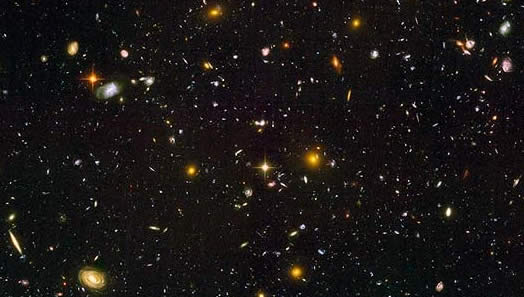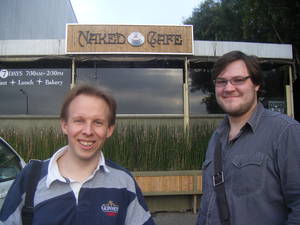The Birth of the Universe, over coffee
Interview with
Hans - We are pretty sure that the universe began with a big explosion of space. The evidence as we know and see around all confirm that this started what we call a Big Bang.
Chris - When, roughly, did that happen?
 Hans - We know quite precisely when that happened because we can use the laws of physics to extrapolate from the present condition back to the beginning. It is approximately 13.6 billion years. That is a billion with a 'b'.
Hans - We know quite precisely when that happened because we can use the laws of physics to extrapolate from the present condition back to the beginning. It is approximately 13.6 billion years. That is a billion with a 'b'.
Chris - So, ever since then we think the universe has been expanding outwards. Does that mean then that you could notionally wind time back and find the point where the universe began?
Hans - That's an interesting thought and in fact that's how we calculate the age of the universe: by running the movie backwards, so to speak. One of the principles of the cosmological theory that describes the universe's early beginnings is there is no space where the universe began. To put it another way, there's no location where you can point to and say 'here's where it began.' It began everywhere at the same time. That's a very hard notion to get a hold of. Nevertheless, we firmly believe that this is true.
Chris - So the universe begins at one very powerful but very tiny point and suddenly something happens and it begins to expand. Does everything happen uniformly after that?
 Hans - The expansion happened suddenly and it didn't happen uniformly. We think that in the very early beginning of the expansion there was an era which we call inflation where the universe expanded extremely rapidly. The velocities exceeded the speed of light by many, many factors. After about a very short time the universe resumed a normal expansion as we observe today.
Hans - The expansion happened suddenly and it didn't happen uniformly. We think that in the very early beginning of the expansion there was an era which we call inflation where the universe expanded extremely rapidly. The velocities exceeded the speed of light by many, many factors. After about a very short time the universe resumed a normal expansion as we observe today.
Chris - How would we get to the bottom of why there would have been those two phases? When there's a sudden burst of energy one would assume that things would just expand. Why would it behave in this interesting way?
Hans - This is completely unknown at the moment. There are speculations but we have no real evidence and I hope to further the field by eliminating at least some of the hypothesis about inflation by my experiment.
Chris - What are you going to do?
Hans - We have obtained funding, my colleagues and myself, which is dedicated to observing the radiation that was emitted during inflationary era. We will very carefully study the properties of that radiation, in particular something called polarisation. The polarisation is supposed to carry the imprint of the inflationary era with it.
Chris - So you're looking at radiation left over from the Big Bang. This is cosmic background radiation that you're going to study. Written in to that is the fingerprint of what happened in the early universe. How would you get that out of the cosmic background radiation then?
Hans - This is by studying the polarisation of the light. Polarisation of light is something everyone is familiar with because we all have Polaroid sunglasses and we have all been on the beach at one time or another in our lives. If you look at the water's surface with your Polaroid glasses and rotate them you will see dark and light areas. This is because the Polaroid sunglasses let through Polaroid light only polarised in one direction. Our telescope is just like that except it has got sunglasses that are ten feet, three metres in diameter. We catch the radiation with a very big dish and we measure the polarisation by essentially doing the same thing I just described with the small sunglasses.
Chris - What will you be looking for that will tell you whether or not this theory of sudden inflation and then a slower inflation is right or not?
Hans - What we'll be looking for is the polarisation itself. If the polarisation is found then we can be sure that inflation did happen. It's kind of a negative confirmation. If you don't see it we know nothing. If we do see it, we do see the polarisation then we are pretty sure inflation happened.
Chris - It sounds to me like the large hadron collider, the most expensive experiment in the history of physics. If we don't see anything it doesn't actually prove anything. If you do detect polarisation it still doesn't tell you why it happened. Have you got any theories as to why it could have happened?
Hans - That's entirely correct. When we measure the polarisation we will know it did happen very likely. We will not really know why it happened yet. More experimentation will be needed to find that out.
Chris - How will you solve that one?
Hans - I don't know. This is something that we haven't thought about very much yet because we first need to establish that inflation did happen before we worry about why it happened. Perhaps we will find out it didn't happen!
- Previous Nano-Sensors
- Next Quest for the Best Public Information Website









Comments
Add a comment